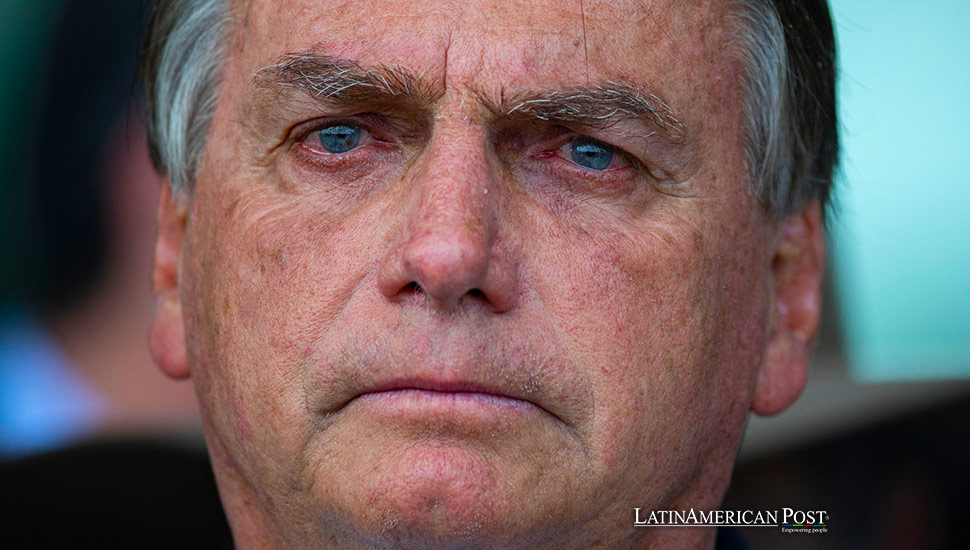Former Brazilian President Bolsonaro Accused of Embezzling Luxury Jewelry

Brazilian federal police have formally accused former President Jair Bolsonaro of embezzlement for allegedly misappropriating luxury jewelry given by the Saudi Arabian government during his tenure, marking another legal challenge for the ex-leader.
Brazilian federal police on Thursday formally accused former President Jair Bolsonaro of embezzlement for allegedly misappropriating jewelry he received. In contrast, the head of state included luxury items given by the Saudi Arabian government, two police sources said. This is the second time police have formally accused Bolsonaro of a crime. He was charged in March with forging his COVID-19 vaccine records.
The jewelry, some made by Chopard of Switzerland, was valued at $3.2 million and included a diamond necklace, ring, watch, and earrings given to Bolsonaro and former first lady Michelle Bolsonaro by the Saudi government. The value and origin of these items are significant as they raise questions about potential influence from foreign powers and the ethical implications of accepting such expensive gifts. Some of the jewelry was seized by customs officials at Sao Paulo’s international airport in October 2021 when it was found in the backpack of a government aide returning from Riyadh.
According to one of the sources, who spoke to Reuters on the condition of anonymity, the police accused Bolsonaro of money laundering, criminal association, and embezzlement. Brazil’s federal police did not immediately respond to requests for comment, and Bolsonaro’s lawyer did not return calls requesting comment. His legal defense had previously denied that the former president had committed any crimes. On Thursday, his eldest son Flavio, a senator, wrote on his account on the social media platform “X” that Bolsonaro was being “persecuted.”
In an investigation authorized by Supreme Court Justice Minister Alexandre de Moraes, police last year searched the homes of military officers who allegedly helped Bolsonaro sell some of the jewelry in the United States. At the time, Justice Moraes said the items had been sold, and the sale had not been declared. The police also formally accused on Thursday former mines and energy minister Bento Albuquerque, whose aide had returned with him from a visit to Riyadh, Bolsonaro’s former aide-de-camp Mauro Cid, who was allegedly involved in selling jewelry, his lawyer Frederick Wassef, and his spokesperson Fabio Wajngarten, according to a source.
Responses and Reactions
In his ‘X’ account, Wajngarten said the accusation was ‘arbitrary, unfair and persecutory,’ arguing he had just instructed Bolsonaro to return the gifts to Brazil’s audit court. This response reflects the defense’s position that the gifts were not intended for personal use and were to be returned to the state. Cid’s lawyer stated that his client has been under a plea bargain agreement with Brazilian authorities, saying the police accusation is just another phase of the investigation. Wassef said in a statement he only bought a watch in the United States with his own money to return it to Brazilian authorities. According to him, Cid and Bolsonaro had yet to tell him to purchase back the watch. Albuquerque could not immediately be reached for comments.
News website G1 reported earlier on Thursday that police had formally accused Bolsonaro. Brazil’s prosecutor general can now charge Bolsonaro based on police accusations. Later, the former president could be indicted if a judge accepts these potential charges.
Historical Context and Implications
This accusation against Bolsonaro is significant, as it comes on the heels of multiple controversies and legal issues that have plagued his political career. Bolsonaro’s administration was marked by numerous allegations of corruption, mismanagement, and controversial policies, which have deeply polarized the Brazilian public. The accusations of embezzling luxury jewelry and previous charges of forging COVID-19 vaccine records further tarnish his legacy and complicate his political future.
The involvement of high-ranking officials and military officers in the alleged scheme underscores the extent of the corruption network. Bento Albuquerque, Mauro Cid, and others implicated in the case have held influential positions, suggesting that the misuse of power and resources was widespread within Bolsonaro’s administration. This network of corruption has significant implications for Brazil’s political landscape and the integrity of its institutions.
Bolsonaro’s legal troubles also highlight the challenges faced by Brazil’s judicial system in holding influential figures accountable. The Supreme Court’s involvement and the ongoing investigations demonstrate a commitment to pursuing justice, underscoring the crucial role of the judiciary in upholding the rule of law. However, they also reveal the complexities and obstacles in prosecuting high-profile cases.
The accusations against Bolsonaro resonate beyond Brazil, as they reflect broader issues of corruption and accountability in Latin America. Many countries in the region have struggled with similar challenges, where political leaders and officials have been implicated in corruption scandals. The Odebrecht scandal, for example, exposed widespread corruption involving several Latin American countries, highlighting the pervasive nature of the issue.
Bolsonaro’s case is particularly significant because it involves the former head of state of one of Latin America’s largest and most influential countries. The outcome could influence how other countries in the region address corruption and strengthen their judicial systems. It also serves as a reminder of the importance of transparency, accountability, and the rule of law in maintaining public trust and democratic governance.
In recent years, there has been a growing demand for accountability and justice in Latin America, driven by public protests, investigative journalism, and civil society organizations. The accusations against Bolsonaro are part of this broader movement, which seeks to hold leaders accountable and address the systemic issues that enable corruption and abuse of power.
Future Directions and Legal Challenges
As the legal process unfolds, Bolsonaro’s defense team will likely challenge the accusations and attempt to discredit the investigation. The involvement of powerful allies and supporters, including his son Flavio and other political figures, adds another layer of complexity to the case. Bolsonaro’s legal strategy will be closely scrutinized, as it could impact the broader fight against corruption in Brazil and beyond.
The prosecutor general’s decision on whether to charge Bolsonaro will be a pivotal moment in the case. If charges are filed, the judicial proceedings will likely be lengthy and contentious, with significant political and legal implications. The potential indictment of a former president on charges of embezzlement, money laundering, and criminal association is unprecedented in Brazil. It could have far-reaching consequences for the country’s political stability and governance, shaping its future trajectory.
The international community will also be watching the case closely. Brazil’s handling of the accusations against Bolsonaro will be seen as a test of its commitment to justice and the rule of law. The case’s outcome could influence Brazil’s relations with other countries, particularly those in Latin America, and its standing in the global community.
Also read: Brazilian Real Plunges Amidst Government Communication Woes and Market Noise
The formal accusation of former President Jair Bolsonaro for embezzlement and other crimes marks a significant development in Brazil’s ongoing struggle against corruption. The case highlights the challenges and complexities of holding influential figures accountable and the broader implications for Latin America. As the legal process unfolds, the eyes of the world will be on Brazil, watching how it navigates this critical moment in its history. The outcome of this case could set a precedent for future efforts to combat corruption and strengthen democratic governance in the region.





